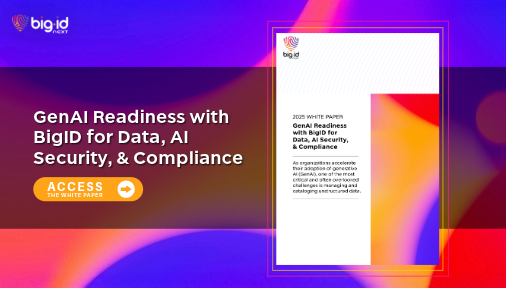Artificial intelligence (AI) is reshaping the technology landscape at an unprecedented pace. From advanced analytics and autonomous systems to personalized user experiences and real-time decision-making, AI is powering the next generation of innovation across the tech sector. But AI’s capabilities are only as powerful as the data that fuels them.
As tech companies race to develop and deploy AI systems, they face a critical, often under-addressed challenge: preparing and securing data for AI readiness. This process goes far beyond basic data wrangling. It requires deep visibility, governance, and trust in data assets to ensure AI models are accurate, ethical, explainable, and compliant.
The Stakes— Why Data Preparation and Security Matter
Tech companies operate in data-rich environments. Customer data, usage telemetry, developer logs, code repositories, and IoT signals represent a goldmine for AI. But leveraging this data without the right controls can lead to serious consequences:
- Model Bias and Inaccuracy: Poor data quality or unvetted inputs lead to flawed AI outputs.
- Security Exposure: Sensitive information used for training can be inadvertently leaked or misused.
- Regulatory Noncompliance: AI systems trained on personal or regulated data face new legal scrutiny under laws like the EU AI Act, GDPR, and evolving U.S. privacy laws.
- Reputational Risk: High-profile failures, data breaches, or ethical lapses erode customer trust and brand value.
The path to effective, scalable, and responsible AI starts with mastering the data pipeline.
Key Challenges in AI Data Preparation for Tech Firms
1. Data Discovery at Scale
AI thrives on data variety, volume, and velocity. But most tech companies lack a complete inventory of what data they have, where it lives, and how it’s used. Unstructured data, shadow IT, and cloud sprawl make it nearly impossible to govern AI training inputs without advanced discovery.
2. Sensitivity and Classification
Not all data is safe or appropriate for use in AI. Companies must classify data by type (e.g., PII, source code, telemetry), context, and sensitivity to prevent regulated, biased, or proprietary data from entering AI pipelines unmonitored.
3. Data Quality and Integrity
Poor data hygiene compromises model accuracy and fairness. Duplicate records, mislabeled fields, or incomplete datasets lead to garbage-in-garbage-out outcomes. Cleansing, enrichment, and lineage tracking are essential for trusted AI.
4. Consent and Purpose Limitation
Many privacy laws—like GDPR and India’s DPDPA—require organizations to limit data processing to the purpose for which consent was given. Reusing personal data for AI without explicit permissions can trigger compliance violations.
5. Governance and Auditability
AI systems are increasingly subject to audits and accountability frameworks. Organizations must maintain detailed documentation on how training data was collected, classified, and secured—and be able to trace that lineage across environments.
6. Secure Collaboration Across Teams
Data scientists, engineers, compliance teams, and product owners all touch the AI lifecycle. Without a unified governance layer, data access becomes siloed or uncontrolled, risking data leakage and security gaps.
Best Practices for AI Data Readiness in Tech
To address these challenges, leading technology companies are adopting a data-first approach to AI development.
This means:
- Building a Centralized Data Inventory: Create a comprehensive map of all data assets—structured, unstructured, on-prem, and cloud—to establish a baseline for governance.
- Automating Data Classification: Use metadata and machine learning to identify sensitive, regulated, or high-risk data at scale.
- Implementing Fine-Grained Access Controls: Enforce role-based access policies and data minimization principles across AI workflows.
- Tracking Data Lineage and Provenance: Maintain full transparency into how data was collected, processed, and used for model training.
- Embedding Privacy by Design: Bake consent and ethical usage principles into every stage of AI development.
- Establishing Cross-Functional Governance: Bring together stakeholders across legal, compliance, security, and AI teams under shared accountability frameworks.
Intelligent Data Governance for AI with BigID
BigID helps organizations connect the dots across data & AI: for security, privacy, compliance, and AI data management. Our next-gen platform enables customers to find, understand, manage, protect, and take action on high-risk & high-value data, wherever it lives.
BigID empowers technology companies to prepare and secure data for AI—at scale.
- Discover and Inventory Data Across All Sources: Get visibility into all your data, wherever it lives—structured or unstructured, on-prem or cloud.
- Classify and Tag Sensitive Data for AI Readiness: Identify PII, IP, and other high-risk data automatically, and flag it for appropriate use.
- Map Data Lineage and Track Model Inputs: Gain full transparency into what data went into which models, and maintain defensible audit trails.
- Enforce Consent, Purpose Limitation, and Retention Policies: Ensure data used for AI is compliant with internal policies and evolving regulations.
- Operationalize AI Governance with Automation: Streamline policy enforcement, access reviews, and risk mitigation for cross-functional teams.
Whether you’re developing generative models, deploying embedded AI in SaaS platforms, or piloting ML analytics, BigID helps you secure the data that powers it all—so your innovation is built on a foundation of trust, compliance, and control.
See BigID in action— book a 1:1 demo with our experts today.



